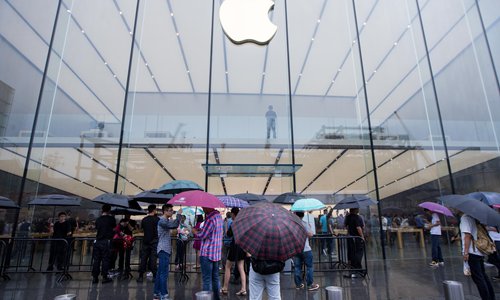HOME >> BUSINESS
Another bite for Apple
Source:Reuters-Global Times Published: 2019/7/31 18:08:40
Apple services, wearables shore up results as iPhone sales drop below half

Consumers at an Apple store in Hangzhou, capital of East China's Zhejiang Province File photo: VCG
Apple Inc iPhone sales have dropped to less than half of quarterly revenue for the first time in seven years, but CEO Tim Cook on Tuesday (US Time) described the change as successful diversification away from a single product and forecast results above Wall Street targets.
That strategy proved especially useful in China, the world's largest smartphone market. Investors feared a drumbeat of negative shipment data from the Chinese government and analysts foresaw problems for the iPhone maker.
Apple's Greater-China sales, which had gone into a near free fall earlier this year, dipped only slightly, assuaging concerns that trade tensions were undermining Apple's standing in one of its most important markets.
Moribund global mobile phone sales have led Apple to focus on accessories like the Apple Watch and sales growth in music, apps, gaming, video and a credit card which will hit shelves in August. In the Chinese mainland, Cook said that the overall number of Apple device users had grown in the fiscal third quarter, helping to increase the market for its services, whose sales were up by more than 10 percent there.
"We actually grew in Chinese mainland," Cook said. "Non-iPhone revenue grew 17 percent. We grew in every category outside of iPhone."
But globally, iPhone sales have fallen 12 percent to $25.99 billion, after dropping 17 percent in the previous quarter, and matched Wall Street targets. Wearables and other accessories revenue rose nearly 50 percent, topping expectations.
Services revenue rose 12.6 percent to $11.46 billion, slowing and slightly missing expectations but setting a new record regardless.
Apple said it expects revenue for the current fiscal fourth quarter to be between $61 billion and $64 billion, compared with analyst estimates of $61.02 billion. At the high end of Apple's forecasted range, sales would beat the prior year's $62.90 billion, despite the fact that analysts expect continued lackluster iPhone sales until 5G models arrive in 2020.
For the fiscal third quarter, which ended in June, Apple reported a 1 percent rise in revenue to $53.8 billion and a 7 percent drop in earnings per share to $2.18, compared with expectations of $53.39 billion and $2.10 per share, according to Refinitiv data.
Hal Eddins, chief economist for Apple shareholder Capital Investment Counsel, said he was pleasantly surprised to see the decline in iPhone sales slow down after the prior quarter.
"You really don't hear people talk about their phones like they did several years ago," Eddins said. "The key is that when people want to splurge on a phone, they do it with an Apple product."
Apple did not reveal the current number of active Apple devices, but in January it said it was 1.4 billion, with 900 million of those being iPhones. Investors used the number, referred to as the installed base, as a proxy for how many subscribers it can gain for its services business. Cook told investors during a conference call on Tuesday that Apple has 420 million paid subscribers to its own services and third-party apps. The company has set the goal of increasing this number to 500 million by 2020.
Trip Miller, managing partner at Apple shareholder Gullane Capital Partners, said he wants to see services growth return to the 20 percent range and thinks Apple needs to use its billions in cash to buy media properties to fuel its forthcoming television service.
"You have to have a bigger installed base and have services that people get value from," Miller said.
Trade tensions
Apple reported results as US and Chinese trade negotiators resumed on-and-off talks. US President Donald Trump has suspended new tariffs on a final $300 billion of Chinese imports, which would include iPhones.
Apple's market share in China declined to 5.8 percent from 6.4 percent, according to market research firm Canalys, in part because smartphone rival Huawei Technologies Co gained market share to become the top handset seller in the country.
Apple experienced a smaller market share loss than competitors such as Xiaomi Corp, Oppo and Vivo, according to Canalys data. Cook said that iPhone price adjustments, plus the Chinese government's move to cut phone taxes, helped keep iPhone sales in China from eroding further.
"Our trade-in and financing programs are doing extremely well in China," Cook said. "Because of the active installed base is growing in China, our services business is doing very well, growing double digits."
Apple shares have gained more than 20 percent since early June, when shares dropped upon the news that the US Department of Justice had jurisdiction over the company in a potential probe as part of a broader review of whether technology giants engage in anticompetitive practices.
Apple said revenue for its "wearables, home and accessories" segment, that contains devices like the Apple Watch and AirPods, was $5.53 billion, compared with analyst estimates of $4.81 billion.
Apple stated that it returned more than $21 billion to shareholders during the fiscal third quarter, including $17 billion in share repurchases.